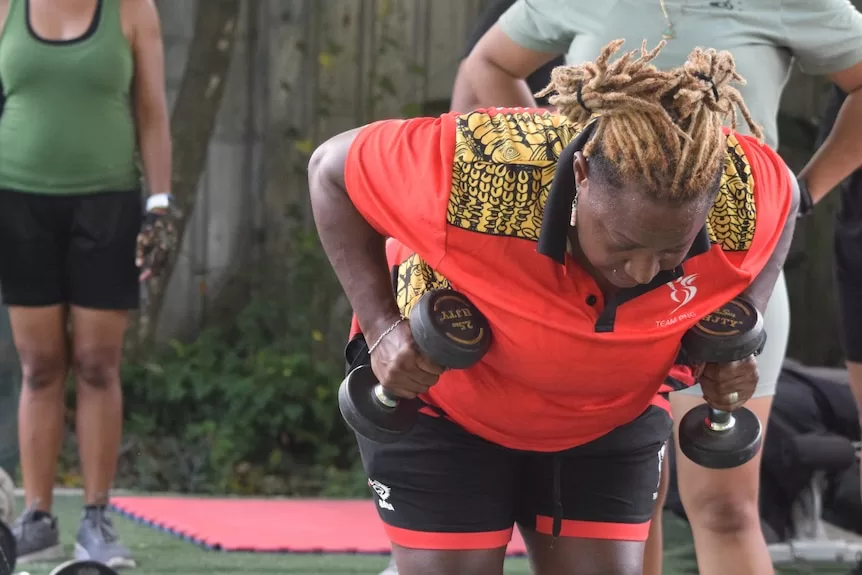After losing her mother to liver cancer in 2019, Cecelia Kanawi knew that to break the cycle and avoid succumbing to lifestyle diseases, she had to make some life-altering decisions.
But little did she know her personal journey would have a ripple effect, attracting more than 100 Papua New Guinean women to her fitness program, called Break a Sweat.
“When I started Break a Sweat it was because personally I was self-conscious with my body,” Cecelia said.
“I was too ashamed to go to the gym and every time I walked into the gym I would wait until all the men or all the women who were already fitness freaks and they look super good in their outfits leave the gym, then I’d go into my little exercise in the corner.
“So when the COVID-19 pandemic happened, that was when all the main gyms shut down so I saw that little gap where I was going to tap into.”
Do you have a story idea about women in sport?
Email us abcsport5050@your.abc.net.au
Building a community
During the pandemic, Cecelia took an online course to become a certified fitness trainer and formally registered her business.
Break a Sweat started with just five members, but three years later Cecelia has more than 100 participants and provides services including personal training, group sessions, and online training to clients overseas.
But what makes Break a Sweat special is the community formed by the women, which extends to more than just fitness buddies.
“I have participants who are members of the disciplined forces (police and defence), health workers, law practitioners like lawyers and magistrates,” Cecelia said.
“And the support each of these women provide for each other when a need arises where a someone needs medical assistance or a protection order (for cases of domestic violence), they step in to assist each other.
“Break a Sweat not only impacted lives of the women that came to me but they also helped me in in return, that’s why I like to refer to it as empowering women through fitness where they support me and I support them back.”
Last year, Cecelia’s fitness program attracted PNG’s Pacific Games gold medallist powerlifter Linda Pulsan to join — later prompting Cecelia to become an athlete.
“She (Pulsan) realised that I had natural strength and the ability to lift weight, so through her recommendation, I was able to train with the Team PNG powerlifters and made my debut at the Pacific Games and won silver,” Cecelia said.
“When I went to compete, my shoes, my belt and my lifting accessories were all paid for by the women that I trained, so it was a community of women that supported me.”
Safe space for women
One of the participants, Matilda Pasum, joined BAS two years ago with the aim to bulk up.
“The environment here is welcoming and joining this has helped me mentally, especially being a full-time mum — it can be stressful,” she said.
“So I made an arrangement with my husband and even though he’s a soldier, he makes time to come home and take of our kids while I attend my sessions.
“He’s been really supportive of my journey and I am very grateful to him for his understanding and support.”
Tahina Booth is a former elite rugby league player, and founder of the Grass Skirt Project, a leading organisation tackling gender-based violence in PNG through innovative sports and wellness initiatives.
She says it’s important to have facilities like Break a Sweat accessible to everyday women in PNG’s capital, and wants the government to help create more spaces like it.
“It is incredibly important to have facilities like Cecelia’s for women’s economic participation and women’s access to physical activity, as it is very low,” Tahina said.
“Cecelia is doing an incredible job in creating a safe space for women in her community who can come and find a sense of belonging as she caters to their physical and mental wellbeing as well as providing nutrition education and dieting advice.
“From what I know, she doesn’t have a huge investment backing her but she’s doing all these with whatever resources and little funding she has.”
Fitness movement
Another gym in Port Moresby, East Street Fitness, owned by couple Florence Daple and William Darius Moaina, has also been striving to produce a successful and safe space for both men and women to have access to a high quality gym setting.
Florence comes from a background of playing local softball and running track in her youth, while her husband Darius played rugby.
The pair understands what it was like as a young athlete trying to find affordable and accessible gym facilities in Port Moresby.
“When you go into a gym setting, you want to be assisted,” Florence said.
“As a female, you get intimidated by all the male counterparts that are actually working out and they know what they’re doing.
“I wanted the help and we weren’t getting that.
“So we just thought to ourselves, why don’t we find a gym or come up with something that will be also available, affordable and will help not just us, but our communities?”
Meanwhile, Cecelia believes that while men can part of the solution in ensuring that women are empowered through fitness in accessing various gym spaces, she wants to see her brand of an all-women fitness grow across PNG.
Patricia Keamo is a sports reporter at The National in Papua New Guinea.
She is part of ABC International Development’s Women in News and Sport Initiative, funded by the Australian Department of Foreign Affairs and Trade through the Team Up program.
